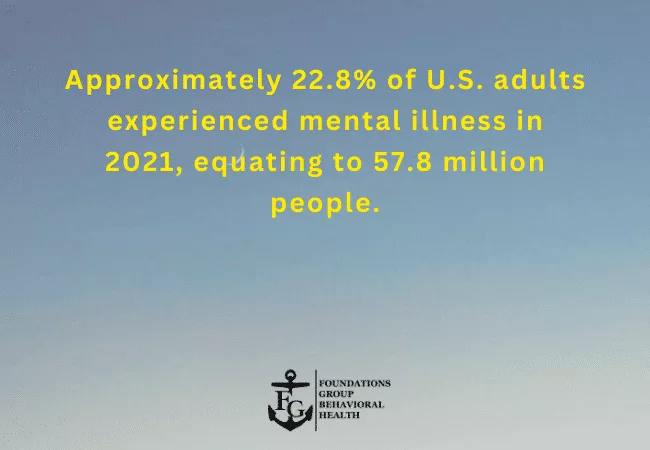Choosing the right level of mental health treatment is crucial for individuals seeking recovery from conditions such as anxiety, depression, PTSD, and co-occurring disorders. While Psychiatric Day Treatment (Partial Hospitalization Program or PHP) and Inpatient Psychiatric Care both provide structured support, they differ in intensity, duration, setting, and goals.
At Foundations Group Behavioral Health, we offer Psychiatric Day Treatment in Massachusetts as part of our Mental Health Treatment Programs, providing individuals with comprehensive care while maintaining their independence. This guide explores the key differences, benefits, and ideal candidates for each treatment option to help individuals make informed decisions about their mental health care.
Understanding Psychiatric Day Treatment and Inpatient Care
What is Psychiatric Day Treatment?
Psychiatric Day Treatment (also known as a Partial Hospitalization Program or PHP) is a structured, intensive outpatient treatment program that provides daily therapy and psychiatric care while allowing individuals to return home in the evening.
Key Features of Psychiatric Day Treatment:
- 5-7 hours of structured therapy per day, 5 days a week
- Combination of individual therapy, group therapy, and psychiatric care
- Focuses on skill-building, emotional regulation, and coping strategies
- Individuals live at home, maintaining family and community connections
- A step-down from inpatient hospitalization or an alternative to residential care
Psychiatric Day Treatment is an ideal option for individuals needing intensive treatment but who do not require 24/7 hospitalization.
What is Inpatient Psychiatric Care?
Inpatient psychiatric care is a hospital-based or residential mental health program that provides round-the-clock supervision for individuals experiencing a mental health crisis or those at risk of harming themselves or others.
Key Features of Inpatient Care:
- 24/7 medical and psychiatric supervision
- Designed for individuals in acute mental health crises
- Short-term stays typically lasting from a few days to several weeks
- Focuses on crisis stabilization and immediate safety
- Medication adjustments and emergency interventions provided
Inpatient care is critical for individuals in severe distress but is not necessary for those who can safely live at home while receiving structured therapy.
Comparing Psychiatric Day Treatment vs. Inpatient Care
| Aspect | Psychiatric Day Treatment (PHP) | Inpatient Psychiatric Care |
|---|---|---|
| Level of Care | Intensive, structured treatment with the ability to live at home | Highest level of care for individuals in crisis |
| Living Arrangements | Individuals live at home and attend daily sessions | Patients stay in a hospital or residential facility 24/7 |
| Duration of Treatment | Weeks to months, depending on individual progress | Typically a few days to weeks, focusing on crisis stabilization |
| Supervision | Scheduled therapy and psychiatric oversight | 24/7 monitoring with medical and psychiatric staff |
| Therapeutic Approach | Focuses on skill-building, therapy, and emotional regulation | Focuses on immediate safety, medication stabilization, and crisis intervention |
| Best For | Individuals needing intensive treatment but who can function outside of a hospital | Individuals experiencing severe psychiatric crises, suicidal ideation, or psychosis |
Both options serve important roles in mental health treatment, and the right choice depends on an individual’s symptoms, safety, and support system.
Key Benefits of Psychiatric Day Treatment Over Inpatient Care
1. Allows Individuals to Stay at Home and Maintain Daily Routines
One of the biggest advantages of Psychiatric Day Treatment is that individuals can continue living at home while receiving intensive treatment. This allows them to:
- Maintain a sense of normalcy by staying in their familiar environment.
- Stay connected with family, friends, and support networks.
- Apply coping strategies in real-life situations outside of therapy.
Inpatient care, while necessary for individuals in crisis, removes individuals from their daily environment, which can make transitioning back to normal life more challenging.
2. Provides Intensive Therapy Without 24/7 Hospitalization
For individuals who need more than traditional outpatient therapy but do not require full-time hospitalization, Psychiatric Day Treatment offers a structured, high-level of care without disrupting daily life.
- Daily therapy sessions (individual, group, and family therapy)
- Cognitive Behavioral Therapy (CBT) for managing anxiety and depression
- Dialectical Behavior Therapy (DBT) for emotional regulation
- Mindfulness, stress reduction, and wellness coaching
This level of care effectively treats anxiety, depression, trauma, and co-occurring disorders while allowing individuals to retain independence.

3. Focuses on Long-Term Coping Skills and Emotional Regulation
Unlike inpatient care, which primarily focuses on crisis stabilization, Psychiatric Day Treatment helps individuals build long-term coping strategies to manage their mental health.
- Develops healthy coping mechanisms for anxiety, depression, and trauma
- Teaches emotional regulation skills for long-term stability
- Encourages self-sufficiency and resilience
At Foundations Group Behavioral Health, our Psychiatric Day Treatment in Massachusetts focuses on empowering individuals with the tools they need to sustain their recovery.
4. Cost-Effective Alternative to Inpatient Hospitalization
Inpatient psychiatric care can be expensive, especially for prolonged stays. Psychiatric Day Treatment is often more affordable while still providing comprehensive therapy, medication management, and psychiatric support.
- Offers structured treatment at a lower cost than inpatient hospitalization.
- Most insurance providers cover Psychiatric Day Treatment as part of mental health care.
- Flexible treatment plans to accommodate individual financial and medical needs.
This makes Psychiatric Day Treatment an accessible option for many individuals seeking intensive mental health care.
5. Smooth Transition from Inpatient Care to Everyday Life
For individuals who complete inpatient hospitalization, Psychiatric Day Treatment serves as a bridge between hospital care and independent living.
- Continues structured treatment without the need for 24/7 supervision.
- Helps individuals gradually reintegrate into work, school, and daily life.
- Provides ongoing therapy and medication management to prevent relapse.
At Foundations Group Behavioral Health, we offer step-down programs to ensure that individuals receive continued support through Half-Day Treatment and Outpatient Mental Health Programs.
How to Determine the Best Mental Health Treatment for You
If you’re unsure whether Psychiatric Day Treatment or Inpatient Care is right for you, consider the following:
Psychiatric Day Treatment is best if you:
- Need structured mental health care but can safely live at home.
- Are transitioning out of inpatient hospitalization and need continued support.
- Struggle with anxiety, depression, PTSD, or co-occurring disorders.
- Want to develop long-term coping skills and maintain independence.
Inpatient Psychiatric Care is best if you:
- Are experiencing a severe mental health crisis or suicidal thoughts.
- Need 24/7 medical supervision to ensure safety.
- Have severe psychotic symptoms or hallucinations.
- Require medically supervised detox for substance use.
Both treatment options play a critical role in mental health recovery, and your choice should be guided by clinical recommendations, personal needs, and safety considerations.
Final Thoughts
Both Psychiatric Day Treatment and Inpatient Care serve essential roles in mental health recovery. Choosing the right program depends on:
- The severity of mental health symptoms.
- The level of supervision and structure required.
- Your treatment goals and long-term recovery plan.
At Foundations Group Behavioral Health, our Psychiatric Day Treatment in Massachusetts offers a comprehensive, structured program designed to help individuals regain emotional stability and long-term wellness.
If you or a loved one is struggling with mental health challenges, call us today at 888.685.9730 to learn more about our Psychiatric Day Treatment and other Mental Health Treatment Programs in Massachusetts. Your mental health matters—take the next step toward healing today.
FAQ on Psychiatric Day Treatment vs. Inpatient Care
What is the main difference between Psychiatric Day Treatment and Inpatient Care?
Psychiatric Day Treatment provides structured daily therapy while allowing individuals to return home each evening. In contrast, Inpatient Care requires full-time hospitalization for individuals in acute mental health crises.
Who should consider Psychiatric Day Treatment?
Psychiatric Day Treatment is best for individuals who:
- Need intensive mental health care but do not require 24/7 supervision.
- Are transitioning from inpatient hospitalization and need continued support.
- Struggle with anxiety, depression, PTSD, or co-occurring disorders but can safely live at home.
When is Inpatient Psychiatric Care necessary?
Inpatient psychiatric care is essential for individuals who:
- Are experiencing severe mental health crises or suicidal thoughts.
- Require 24/7 medical supervision for safety.
- Are dealing with severe psychotic symptoms or hallucinations.
- Need medically supervised detox for substance use disorders.
What types of therapy are included in Psychiatric Day Treatment?
Individuals in Psychiatric Day Treatment participate in:
- Individual therapy for personal mental health goals.
- Group therapy for peer support and skill-building.
- Cognitive Behavioral Therapy (CBT) for managing anxiety and depression.
- Dialectical Behavior Therapy (DBT) for emotional regulation.
- Mindfulness and relaxation techniques to reduce stress.
How long does a Psychiatric Day Treatment Program last?
The length of treatment varies by individual but typically lasts a few weeks to a few months, depending on progress and specific mental health needs.








